Keeping your grocery store’s customers and employees safe from fire is one of the most important tasks as a safety manager. Fire marshals agree. That’s why they perform regular supermarket and grocery store inspections for both fire protection and life safety – sometimes unannounced.
For the best chance of meeting grocery store fire code requirements and making your local fire authorities happy, here’s a guide for what to expect and what the fire hazards they will look for during your store’s fire inspections. You will also learn easy, effective ways to avoid violations and always remain compliant.
How to Prepare for Grocery Store Fire Inspections
Here’s what you must prepare for your grocery store’s inspection.
- Unobstructed Fire Doors & Fire Exits
- Functioning Exit Signs & Emergency Lighting
- Safe Electrical Systems & Extension Cord Use
- Empty Fire Pump and Riser Rooms
- All Fire Extinguishers Accounted For & Charged
- Operational Smoke Detectors & Carbon Monoxide (CO2) Alarms
- Accessible Fire Alarm Pull Stations & Components
- Correct, Functional Fire Sprinkler & Fire Suppression Systems
Unobstructed Fire Doors & Exits
Unobstructed grocery store fire doors, exits, and pathways are at the top of the list when the fire inspector comes to call. He or she will look for this violation because it’s one of the most commonly broken rules, and compliance is extremely important for emergency evacuations.
To pass this part to the inspection, your supermarket staff must keep all doors, exits, and pathways free of debris and anything that would impede people from getting out quickly, 100% of the time. Deliveries in doorways or merchandise left unattended in grocery aisles – even for a few minutes – can be life-threatening if occupants need to evacuate.
Therefore, all emergency exit doors, hallways, pathways, aisles, and stairways must be kept clear of debris. You can expect inspectors to look for the following:
- All exits open quickly and easily.
- Fire exit doors are self-closing.
- All fire doors are closed unless they’re temporarily held open by an approved device.
Functioning Exit Signs & Emergency Lighting
Take a walk around your grocery store. Are there any exit signs flickering? Is part of a sign not illuminated? Is anything blocking exit signs, like banners or decorations? Inspectors want to see fully illuminated, unblocked exit signs and working emergency lights.
- Make sure your emergency lights will remain lit for 90 minutes during power outages. These must be tested and certified annually by a licensed fire protection company. However, check them in-house monthly, as you never know when your local fire inspectors will show up.
- Exit signs require backup batteries in case there’s a power outage so occupants can safely evacuate in the dark. NFPA code requires exit signs and lighting to be checked monthly.
Safe Electrical Systems & Extension Cord Use
Supermarkets have massive electrical requirements and electric distribution to industrial coolers, cooking equipment, and overhead lighting that must be managed and maintained to avoid fire. It is easy to say, “I’ll fix it later” or plan to use an extension cord as a temporary fix, then forget about it for months.
Faulty electrical and improper extension cord use are major fire hazards that you can bet the fire inspector will be looking for in your grocery stores. To avoid written reprimand or costly fines:
- If a temporary extension cord is needed, be sure employees know to NEVER attach them to each other or to permanent fixtures, or pass them through holes in the wall. Temporary wiring for electrical power and lighting installations is allowed for a period not to exceed 90 days. As soon as possible, get rid of extension cords altogether and add approved electrical outlets where needed.
- Have your electrical engineers inspect, maintain, and repair heavy electrical equipment and lighting on a regular basis.
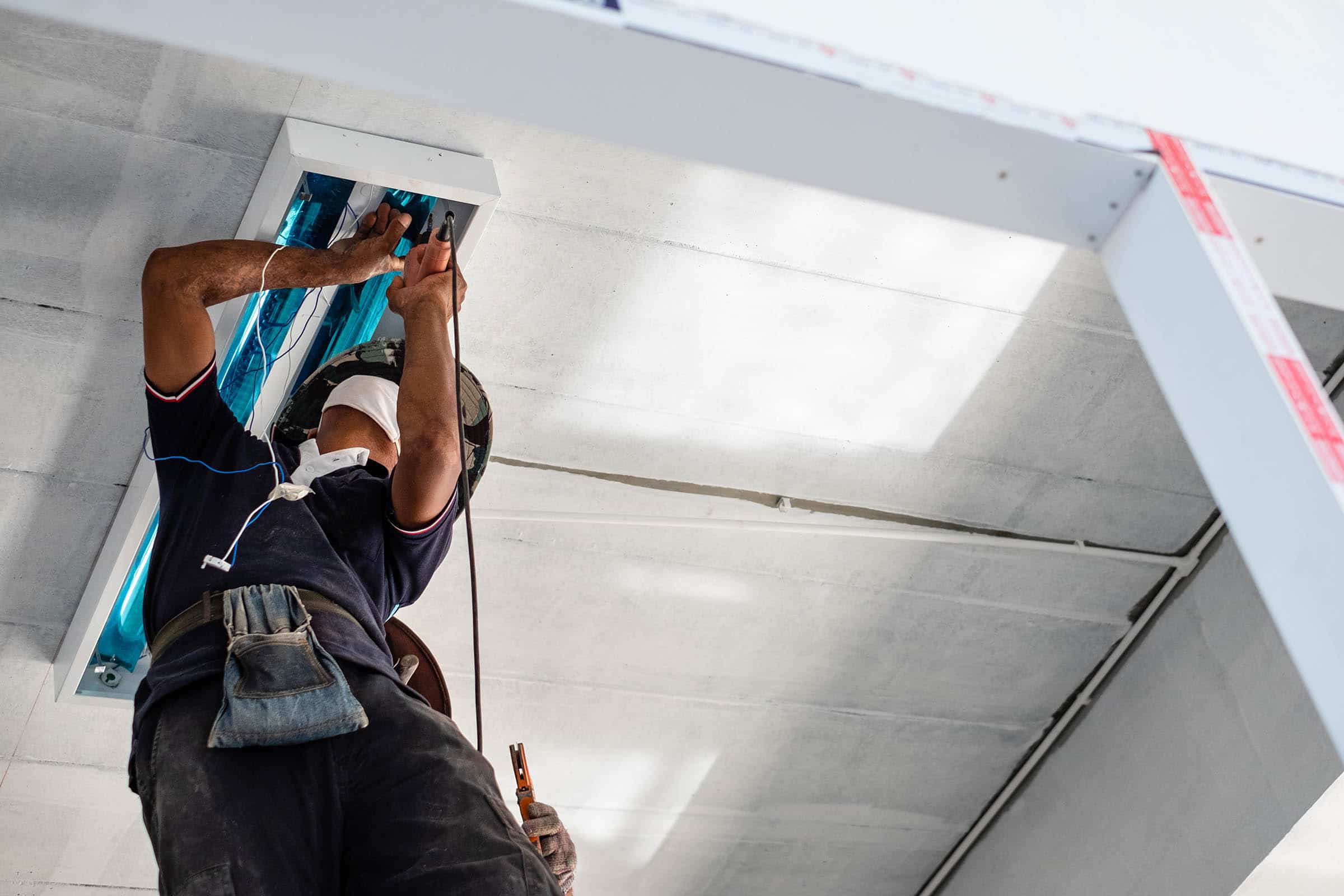
Empty Fire Pump and Riser Rooms
These little rooms are seemingly perfect areas to store things, especially mops, brooms, and miscellaneous items that need to be easily accessible. However, fire inspectors who see fire pump and riser rooms used as closets will warn you not to do it again, ask you to remove the items at once, and may impose a monetary fine.
- During fire safety training, teach employees that fire pump and riser rooms are not to be used for anything other than fire protection equipment. In the event of a fire, emergency personnel need to get into the space to work, and extra items prohibit or slow access to the equipment.
- It’s easy to avoid this violation – simply open fire pump and riser room doors daily to check for unapproved storage.
All Fire Extinguishers Accounted For & Charged
Fire inspectors want to see all fire extinguishers accounted for and fully charged as per NFPA 10, which is also enforced by OSHA inspectors. Missing, damaged, or partially used fire extinguishers are frequent violations in large grocery stores and supermarkets because it is hard to keep track of all of them.
- You must have fully charged, working fire extinguishers classified for each area of your store. NFPA 10 provides requirements for the proper types, testing, inspecting, and recharging of portable fire extinguishers.
- OSHA and NFPA require monthly inspections by a trained staff member to ensure the pressure gauge is on full (needle to green), hose is intact, pin is securely in place, and service tag is attached.
- All fire extinguishers must also be inspected and serviced annually. After every use, they should be refilled and re-inspected by a certified and professional fire protection company, such as AIE.
Operational Smoke Detectors & Carbon Monoxide (CO2) Alarms
Local fire inspectors will look for the right number of smoke detectors and carbon monoxide alarms per square footage, scope, contents, and occupancy of your grocery store or supermarket. They will also ensure every smoke detector and CO2 alarm is operational.
To avoid a fire protection and life safety code violation:
- Hand-test each smoke detector and carbon monoxide alarm weekly.
- When a smoke detector or CO2 alarm begins to chirp, do not remove the batteries, or unhook the wiring until you can get to it later – address it immediately. Replace the batteries or the entire unit if necessary.
- To ensure all detectors and alarms work for the same amount of time, replace batteries on the same day every year, and replace detectors every ten years.
Accessible Fire Alarm Pull Stations & Components
Fire safety inspectors will examine your grocery store’s fire alarm pull stations and components. They should be able to access them easily and see that they have been inspected and tested per NFPA72.
- To pass inspection, keep fire-alarm pull stations unobstructed by merchandise and other goods or equipment.
- Have your fire alarms and components inspected and tested annually by a licensed technician.
- A written log of annual inspections is also required.
When you work with AIE, we keep electronic files of all tests, inspections, maintenance, and repairs per NFPA72 and your local AHJ, and for easy accessibility and record keeping.
Correct, Functional Fire Sprinkler & Fire Suppression Systems
When the fire inspector drops by, your fire sprinklers and fire suppression systems must be up to code for your grocery store’s current contents, size, and occupancy. The inspector may have been to your store many times before, but if the layout has changed, the store has expanded, you’ve added more fryers to the deli department or additional flammable liquids to the home goods aisle, your supermarket’s fire sprinklers and suppression systems (and extinguishers) must match the area’s designation.
- If your grocery store or supermarket has altered business processes, changed commodities, or moved inventory or electrical equipment (like industrial coolers) around, you must update the fire protection system to avoid code violations.
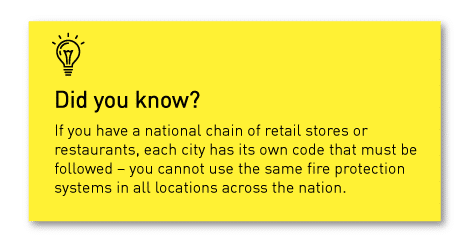
Other Grocery Store Fire Safety Inspection Expectations
During your grocery store’s fire inspection, you can also expect your local fire inspector to look for:
- Nothing hanging from fire sprinkler piping, sprinkler heads, or other fire equipment.
- A written fire safety prevention training manual and documented training program.
- Unobstructed exterior fire department connections and valves.
- A designated smoking area away from the building and flammable objects.
- Trash/waste properly stowed in bins/dumpsters, not piled up in any area, especially doorways.
- All power strips are UL listed with built-in circuit breakers.
- Combustible materials/liquids stored securely in approved cabinet per NFPA/OSHA regulations.
- GFCI protected electrical appliances; nothing hot is on without someone in attendance.
- All supplies/stock/merchandise are at least 3 ft. from heating units and ductwork.
- Proper, updated fire protection and life safety records in accordance with NFPA and AHJ. If you can’t produce the required documentation during a regulatory inspection, it is a fire code violation.
Want more? For your convenience, AIE has created an easy-to-use, printable Retail Fire Safety Checklist so your staff can perform all necessary, daily in-house fire safety inspections and stay compliant.
Fire Protection Inspections: Your Best Defense Against Grocery Store & Supermarket Fire Code Violations
If your local, regional, or national grocery stores or supermarkets don’t have one fire protection company looking out for your interests, these common yet easily avoidable fire code violations can become issues that result in fines, expensive repairs, closures – or worse, endanger customers, employees, and other occupants. Employee training and preventative fire protection inspections are your best defense against these violations.

AIE Partners with Grocery Store & Supermarket Safety Managers & Personnel
We know how challenging fire safety is in grocery stores and supermarkets. Keeping up with code changes and regulations, as well as inspections, maintenance, and repair can be complex. That’s why, when AIE partners with you for your stores’ fire protection, we become your single-source fire and life safety specialist who handles whatever you need, when you need it, nationwide.
We offer fire protection assessments, design, inspections, maintenance, repair, and 24/7 emergency leak and equipment services. Our experts also act as third-party inspector managers during planned fire safety inspections to facilitate the process.
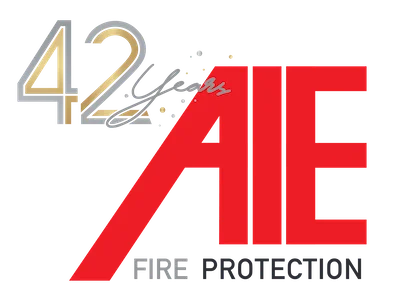
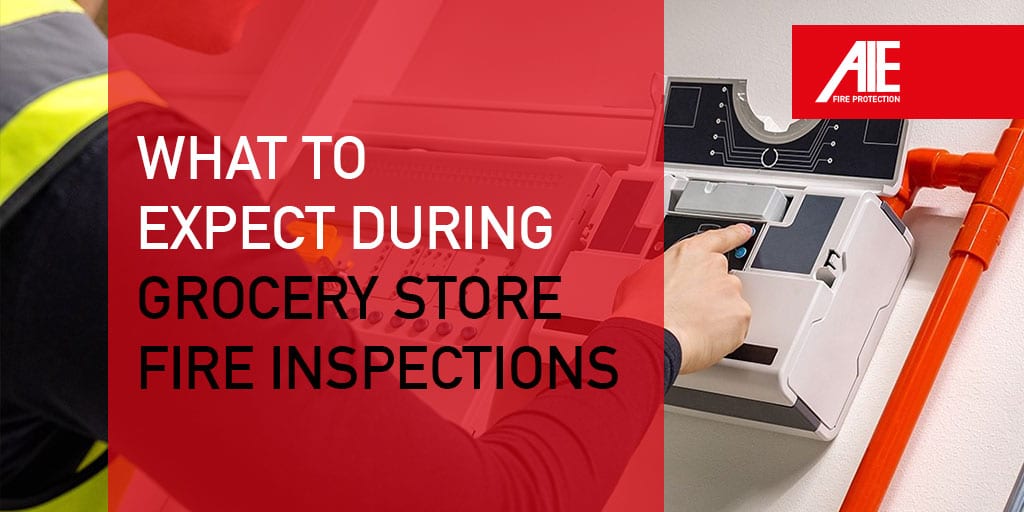
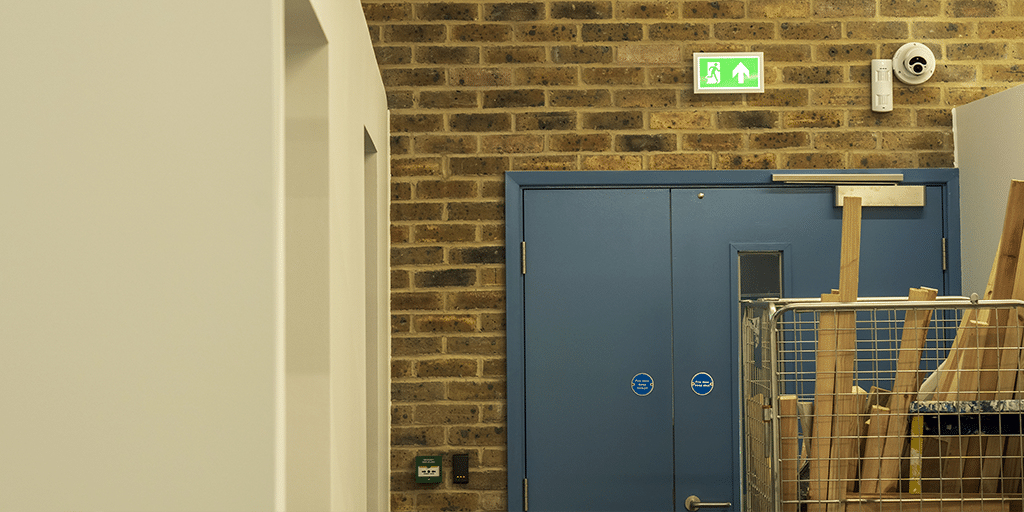
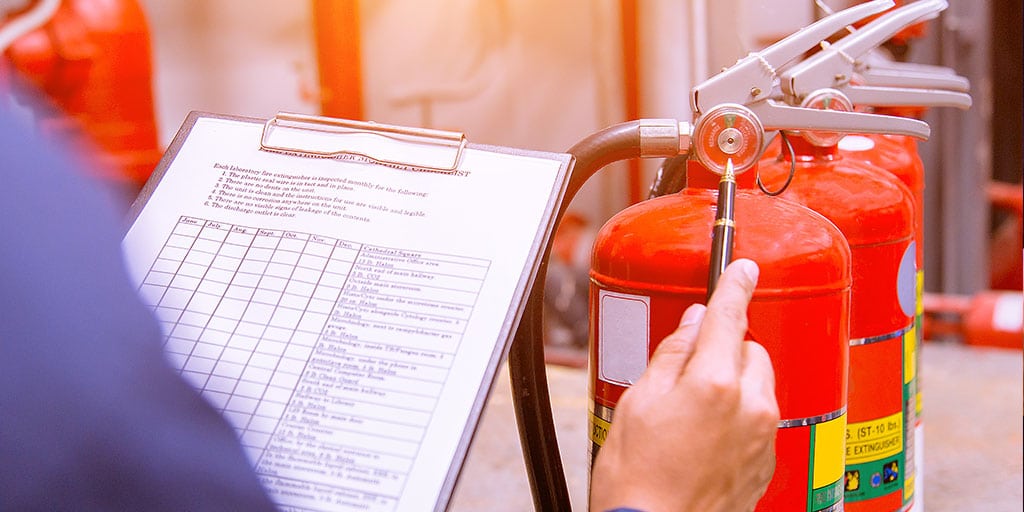
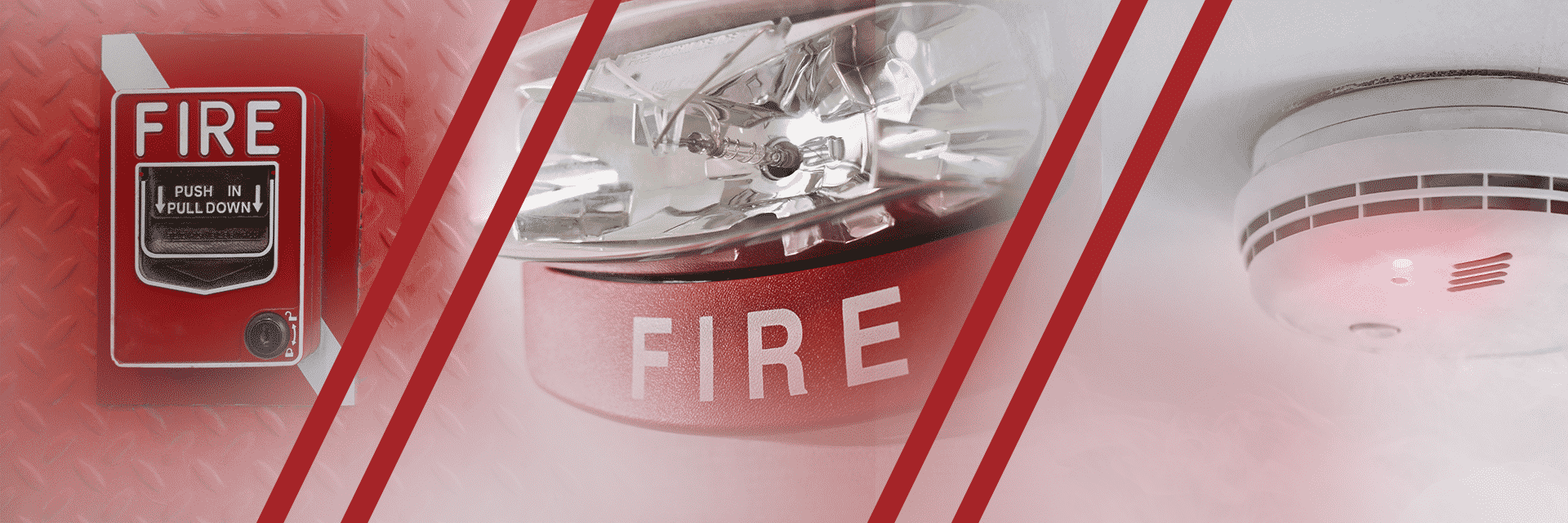
Recent Comments